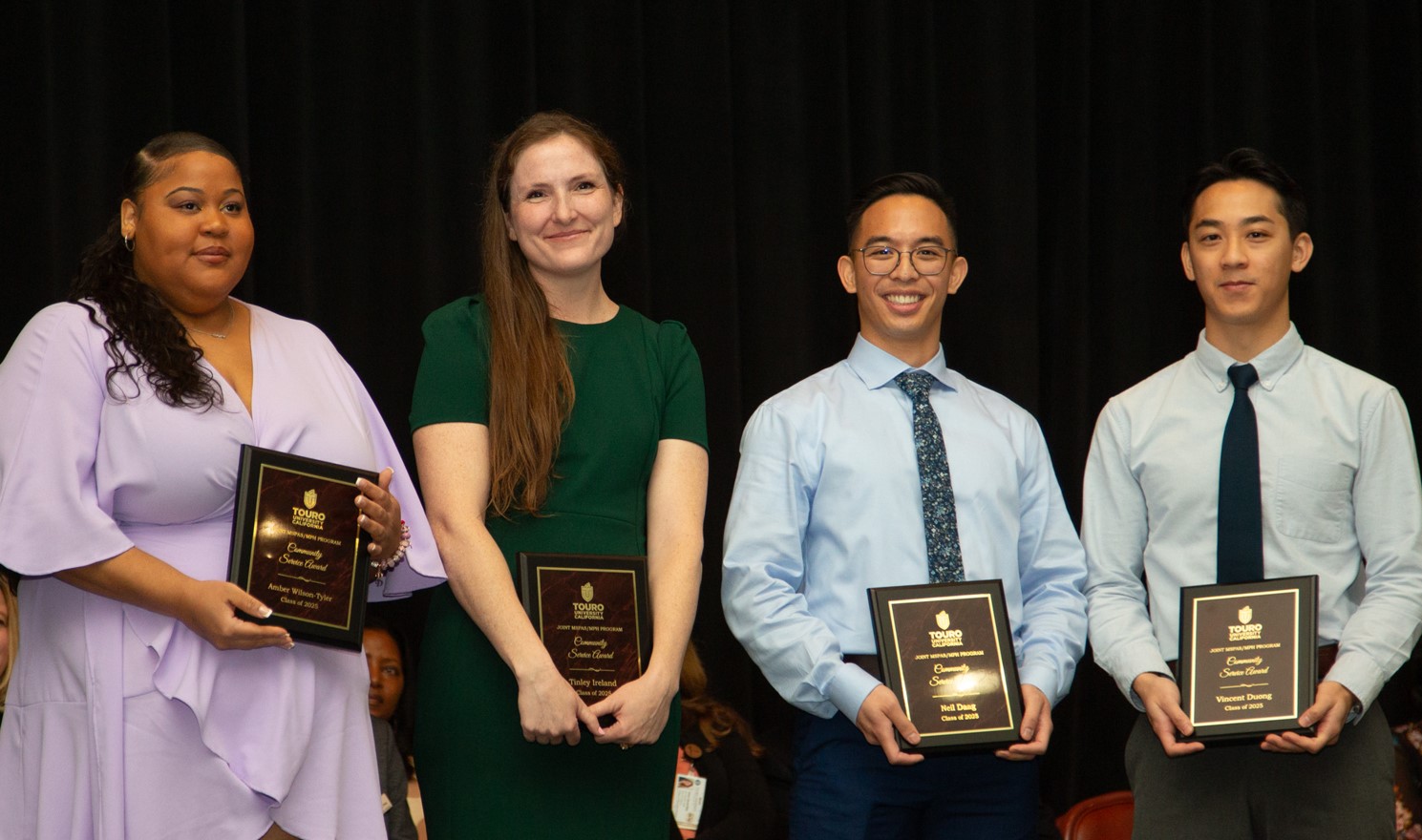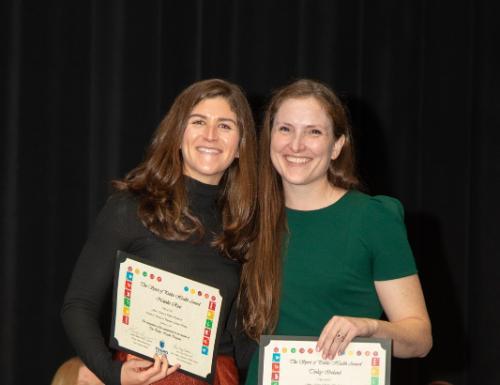PA-MPH Class of 2025 on Rotations
Profiles of Dual Degree Physician Assistant and Master of Public Health Students Venturing Off to Clinical Rotations

With the White Coat ceremony behind them, a look at five class of 2025 students who made an impact on Touro University California (TUC) and the greater community.
Amber Wilson-Tyler
Community Service Award winner
Amber Wilson-Tyler was motivated by a desire to make a difference in underserved communities. After working as an EMT and meeting Physician Assistants (PAs) in the emergency room, Wilson-Tyler chose Touro University California, where the dual PA and Master of Public Health (MPH) education emphasized social justice.
“I chose PA because it has always been important for me to have a job where I can give back to my community,” says Wilson-Tyler. “I'm from Long Beach, CA, and I feel like I grew up in a very disadvantaged and underserved community.”
Driven by the need to help others, Wilson-Tyler served as the class curriculum coordinator (serving as a liaison between the faculty and her cohort), while making time to work with the Street Medicine program to help the local unhoused population.
“I'm in my first rotation right now, on my third week, and so far, it's has been challenging to suddenly re-enter the workforce and work 8-10 hour days again,” says Wilson-Tyler. “Not that you don't do that in PA school, but it’s different. I feel like I'm getting better and more organized as I see more patients.”
Neil Patrick Daag
Community Service Award winner
Growing up in Irvine as a first-generation Filipino American, Neil Patrick Daag felt uncertain about his career path until he discovered a passion for the PA profession. Feeling drawn to its flexibility, emphasis on patient care, and potential to make a meaningful impact in underserved communities, Daag felt that the PA profession was the best fit for him, despite internal pressure.
“I think like any Asian American, first-generation student, you're thinking like doctor, lawyer, dentist, those big professions,” says Daag. “To be honest, I don't really care about the physician title. I just really loved the sciences, helping patients, and connecting with them.”
With the dual degree, Daag says that you learn that there are more factors outside of our own actions that affect our health. One way that translates for him, is promoting preventative care. For him, that means empowering patients to take control of themselves with healthy lifestyles to delay serious issues as long as possible.
Daag’s commitment to primary care is also demonstrated by his decision to attend TUC through the National Health Service Corp (NHSC) Scholarship, which requires him to work in a Federally Qualified Health Center, like La Clinica or OLE Health, after graduation.
“Feeling fortunate in my own upbringing, I have a desire to uplift other communities so that they can live healthier and happier lives,” says Daag.
Vincent Duong
Community Service Award winner
For Vincent Duong, the PA career aligns with his desire for a harmonious work-life balance, recognizing the significant time commitments in a medical career and prioritizing personal and familial obligations. Being able to have a career and be there for his family is important for Duong, something that is possible with a PA job, but would be harder as a physician.
“I realize that if I had a partner asking them to give up their career, to take care of children is just an impossible question,” says Duong.
One issue that Duong has been passionate about is helping people through programs like the Drug Safe Solano Harm Reduction program. The goal is to make an impact by providing clean syringes to slow the spread of diseases, but Duong says that many people simply see it as enabling drug use. Some people see harm reduction as an abstract medical term and people as the problem, rather than larger structural issues.
“We have to think more about social determinants and harm reduction is one of the key tenants of addressing problems in the community; it doesn't address root causes, but it's one of the strategies,” says Duong. “In America, we're so much about individualism, but the fact is that if we want to strive for a greater society, then we need to focus on bigger issues, even if it includes other people you may not care about.”
 Natalie Rice (left on photo)
Natalie Rice (left on photo)
Spirit of Public Health Award
It was while working at a cancer infusion clinic, mostly staffed by PAs, that Natalie Rice knew she wanted to be a PA, too.
“I fell in love with the flexibility of the career because you can switch specialties and gain a lot of knowledge working with different colleagues,” says Rice. “The collaborative experience was something that I was really drawn to.”
Now that Rice heads off to rotations, she’s keeping an open mind, because she feels like that has been the best contributor to her education; being open to anything. That includes issues affecting communities that don’t have adequate access to health care or understand the full impact of the criminal justice system on health. That was part of what brought Rice to TUC.
“The biggest draw to me about Touro was that it integrated public health and PA studies, which is kind of like a no-brainer to me,” says Rice. “It's important to be able to provide medical care in the context of where the patients coming from and being aware of the barriers and boundaries that that patients may be facing.”
Tinley Ireland (right in the photo above)
Community Service and Spirit of Public Health winner
Beginning comparative literature and transitioning through nonprofit work, Tinley Ireland’s journey was an unconventional path toward a career in health care.
“Becoming a PA was something I had always wanted to do when I was young, but I chickened out,” says Ireland. “I returned to that calling when I was a little bit older by taking a bunch of community college courses and doing my pre-clinical experience in primary care.”
For Ireland, practicing family medicine and getting to help everyone in a family, from kids to adults, would be the most meaningful. Having the ability to create better health systems for people in her community motivates her, and now that Ireland is out on rotations, that goal seems closer than ever.
“Getting our white coat and going out in rotations is a big moment where we're taking all our didactic training, everything that we learned in the classroom, and now we're going to be applying it,” says Ireland. “I think the white coat is hugely symbolic because it's something you literally wear, but also a symbol that people associate with a certain level of accountability, integrity, and trust.”
